Regenerative Travel in Latin America

Regenerative travel is transforming Latin America’s tourism industry, going beyond sustainability to prioritize the health of ecosystems and communities. As the region increasingly embraces this travel style, it is setting global benchmarks for creating meaningful experiences for travelers.
With its rich biodiversity and cultural heritage, Latin America is at the forefront of this transformative approach to travel. As we explore the concept in this blog, we uncover a movement that transcends traditional tourism, aiming to restore and enhance destinations for future generations.
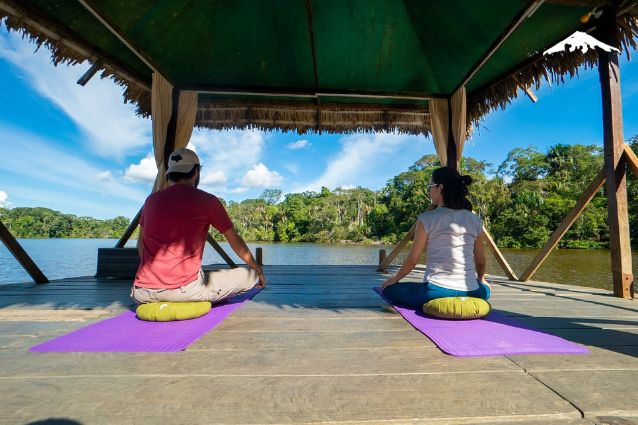
Our guests enjoying a yoga session at the Amazon River in Ecuador.
What Is Regenerative Travel?
Regenerative travel is a holistic approach to tourism that goes beyond sustainability. It aims to leave a positive impact on the environment, culture, and economy of a destination. It emphasizes the restoration and regeneration of natural resources, the empowerment and support of local communities, and the creation of transformative experiences for travelers. Regenerative travel is about giving back and leaving a place better than we found it.
Regenerative travel is central to the B Corp™ philosophy: it fosters an interdependent tourism industry rooted in inclusivity, equitability, and regeneration. Through conscious choices and mindful interactions, travelers become active participants in the regenerative process, sowing the seeds of change for a more sustainable and harmonious future.
The Impact of Traditional Tourism on Latin America
While Latin America has made significant progress in sustainable tourism, there are still environmental challenges posed by traditional tourism practices, including:
- Reduction of natural resources: Traditional tourism in Latin America has often led to the overconsumption of natural resources, including water and energy, putting a strain on the environment and communities.
- Endangerment of biodiversity: The influx of tourists can disrupt local ecosystems, leading to habitat destruction and loss of flora and fauna, particularly in sensitive areas such as the Galapagos and the Amazon.
- Pollution and waste: Tourist activities can increase waste generation and carbon emissions from transportation.
- Cultural erosion: As communities cater to the demands of tourists rather than preserving their unique heritage, mass tourism can lead to local traditions slowly disappearing.
However, there is a growing awareness and commitment to change. The rise of ecotourism and sustainable travel has paved the way for more regenerative practices in the region. The region’s commitment to protecting its assets is evident in the increasing number of eco-friendly accommodations and tours.
Ecotourism involves responsible travel to natural areas, conserving the environment, and improving the well-being of locals. Latin America is witnessing a surge in sustainable travel initiatives, with countries investing in green projects and policies that promote environmental conservation.
Besides protecting nature, sustainable tourism supports local economies by creating jobs. Local communities are increasingly involved in tourism planning and management, ensuring its development is inclusive and beneficial to all stakeholders. International investment and policy guidance boost these efforts significantly.
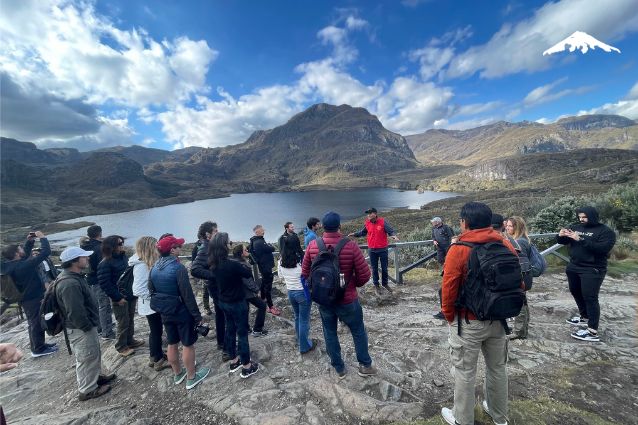
Tour in El Cajas, a national park in Cuenca, Ecuador.
The Importance of Regenerative Travel
The travel industry in Latin America is witnessing a paradigm shift towards ecotourism and sustainable practices. With the region’s tourism rebounding post-pandemic, there’s a growing recognition of the need to preserve its cultural diversity and natural wonders because traditional tourism practices have often put them at risk.
Latin America is home to some of the most biodiverse regions on the planet, including the Amazon rainforest, the Galapagos Islands, and the Andes Mountains. Deforestation, pollution, and the displacement of local communities have been significant challenges. Regenerative travel provides an opportunity to reverse these negative impacts and create a more sustainable future for the region.
The future of tourism in Latin America hinges on the successful integration of sustainable practices that safeguard the environment, empower locals, and ensure long-term economic stability. As the region anticipates substantial growth in tourism revenue, the shift towards ecotourism and sustainable travel is not just a trend but a necessary evolution to ensure the long-term viability of the industry.
Regenerative Travel Practices
In a world where travel has the power to both awe and impact, restoring and revitalizing destinations has never been more crucial. Communities around the globe are embracing practices that not only preserve their cultural heritage but also nurture their natural environments.
Whether it’s reducing carbon footprints or supporting local economies, these initiatives are rejuvenating destinations for wanderers seeking meaningful experiences. Through initiatives like carbon offset programs, organic farming practices, and community-led ecotourism projects, visitors are not only exploring the beauty of Latin America but also actively contributing to its preservation.
By supporting indigenous-led conservation efforts, participating in reforestation projects, and engaging in cultural exchanges with native communities, visitors are not just tourists, but stewards of the land. Each step taken on the cobblestone streets of colonial towns or the sandy shores of remote beaches is a step towards a more sustainable future for generations to come.
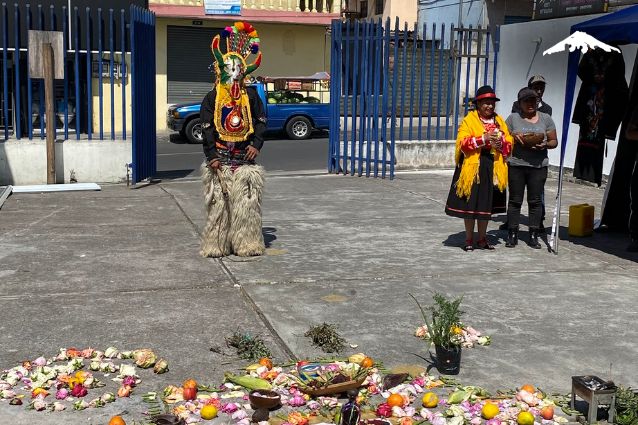
Ceremony in Pifo featuring costumes from an Ecuadorian indigenous group.
Environmentally Conscious Tourism
In a world where the fragility of our ecosystems is increasingly evident, ecotourism is a responsible choice for wanderlust souls. It offers a unique opportunity to experience the wonders of the world while actively contributing to their preservation. It’s about creating travel experiences that are environmentally responsible and culturally respectful. This mindful approach safeguards the environment for future generations while infusing travel with a sense of purpose.
By opting for sustainable choices that prioritize the protection of wildlife, conservation of natural resources, and support for indigenous cultures, travelers can leave a positive impact on the destinations they visit and their residents. This leads to deeper connections forged between travelers and the places they visit, making for a transformative experience that goes beyond typical sightseeing.
Selecting sustainable tour operators is central to ecotourism. They are the ones who prioritize environmental conservation, support local communities, and provide educational opportunities for travelers. Look for experiences that offer a deeper understanding of the ecosystems and cultures of each destination visited, a unique and regenerative way to explore Latin America.
Community-Based Tourism
Community-based tourism is a form of sustainable travel that involves residents inviting visitors to experience their community’s culture and daily life, aiming to generate financial, social, and environmental benefits. This approach allows travelers to engage with destinations through the eyes of those who call them home.
Because hosts participate actively in tourism development, community-based tours foster a more equitable distribution of revenue and support local development. It enriches the traveler’s experience and fosters economic growth, cultural preservation, and environmental sustainability in the host communities.
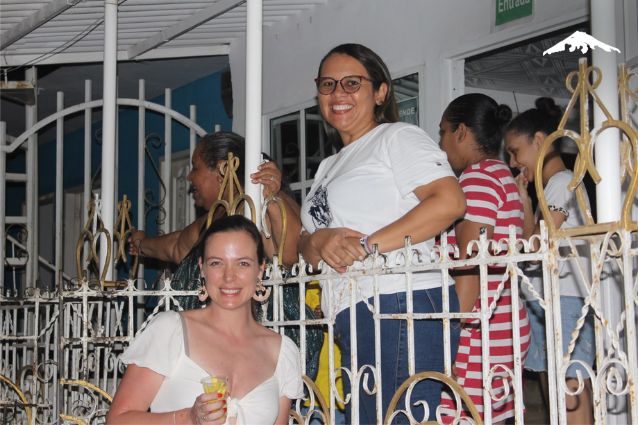
Rebecca’s stay with a local family in Colombia for dinner.
Supporting Local Economies
Tourism is a significant contributor to job creation, with potential for expansion through sustainable practices. Engaging locals as tour guides, artisans, and hosts encourages the development of new skills, empowering individuals to become entrepreneurs and leaders within their communities. By supporting local businesses, travelers can contribute to the long-term economic stability of their hosts.
From staying in locally-owned accommodations to dining at family-run restaurants and purchasing handmade crafts, every choice has the potential to make a difference. Through its direct impact on local economies, regenerative travel creates a positive cycle of economic growth and community development.
The Future of Regenerative Travel
With more and more travelers seeking responsible and meaningful experiences, regenerative travel in Latin America is not just a passing trend but a deep-rooted movement. As this movement gains traction, we can anticipate a future where travel inherently supports and enhances the well-being of both the planet and its inhabitants, setting a new norm for how we explore the world.
This shift towards more responsible and conscious travel practices reflects a growing demand among travelers to not only minimize their footprint but to actively contribute to the regeneration of the destinations they visit. As we become more aware of the impact our travels have on the planet, regenerative travel is poised to become the new standard for ethical and mindful exploration.
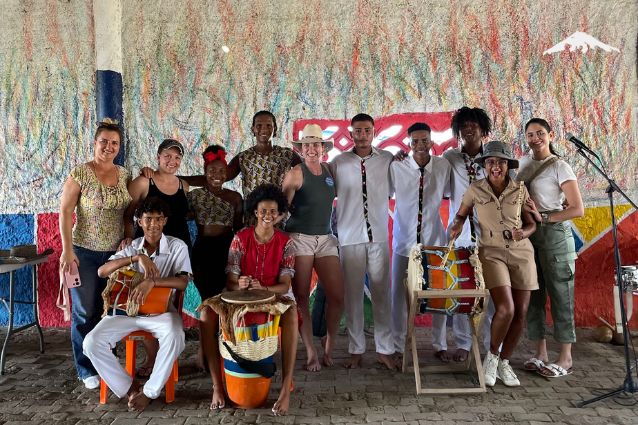
Drum workshop in Cartagena, Colombia.
Embark on a transformative journey to Latin America, where the vibrant tapestry of cultures, awe-inspiring natural wonders, and profound spirituality converge to offer a truly regenerative travel experience. By taking this approach to tourism, wanderers can contribute to the preservation of biodiversity, support local economies, and foster sustainability. Let your soul be nourished and your spirits be uplifted in this land of magic and renewal!
Did you like this blog? You might also like:
- Tourism as a Force for Good in Colombia
- Wellness in the Amazon Rainforest
- Sustainable Travel: Actionable Steps for Your Company



